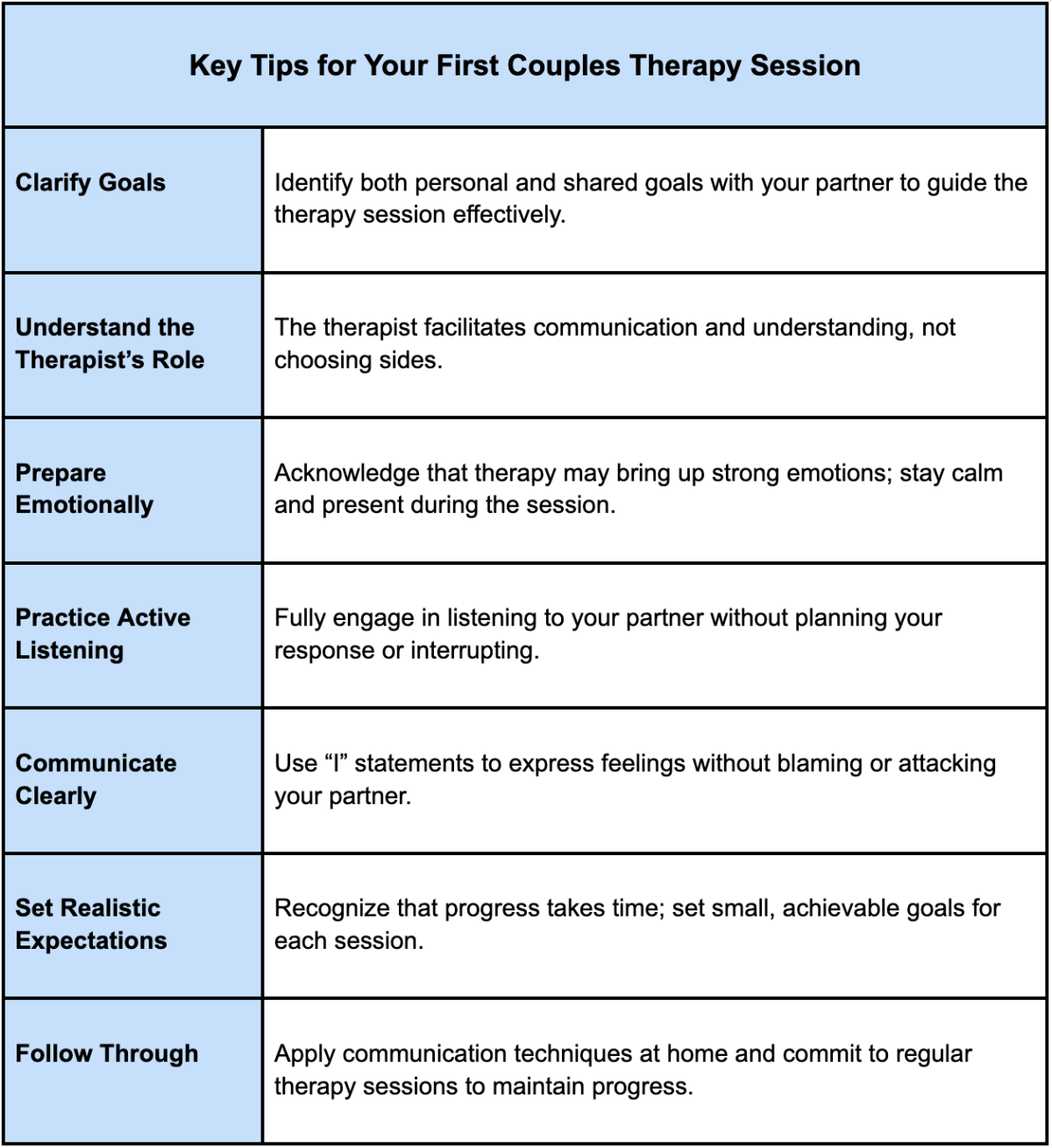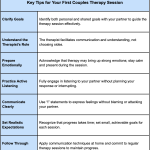Intro: Effective Participation in Couples Therapy for Wholistic Healing
To make the most of your first couples therapy session, begin by clearly identifying both your personal and shared goals with your partner - which will help focus the session and guide the therapist in supporting your relationship effectively.
Couples therapy can be a transformative experience. It is a step in the right direction for most strained relationships. However, the first session can be daunting if you don’t know what to expect.
You take yourself with you wherever you go. It is extremely beneficial to align your mindset and attitude with your goals. Come to your first session with an open mind seeking resolution and progress. A skilled therapist will help you with this, but your help goes a long way.
Brooklyn Psychologist Dr. David Tzall understands the subtleties that truly spark progress in his couples counseling sessions. His extensive experience has led to some very helpful and actionable tips for couples preparing for their first couples therapy session. For effective Couples Therapy in Brooklyn, NYC - Dr. Tzall

What to Expect in Your First Couples Therapy Session
The Role of the Therapist in Couples Therapy
Your therapist acts as a facilitator - a guide for the conversation between you and your partner.
Their job isn’t to take sides or declare who’s right or wrong. Instead, they help both of you communicate more effectively, understand each other's perspectives, and work together toward common goals.They help you build the skills needed to improve your relationship.
What is the Structure of the First Couples Therapy Session?
The first session typically starts with an intake process. This is where the therapist gathers background information about you and your relationship to help set realistic goals for therapy.
You might also engage in some initial communication exercises to ease into the process. Expect to discuss your reasons for seeking therapy, your relationship history, and what you hope to achieve.
Common Elements of the First Couples Therapy Session

Essential Preparation Tips for Your First Couples Therapy Session
Tip #1 Clarify Your Goals, Together.
Before stepping into that therapy room, take some time to clarify both your personal and joint goals.
What do you want to get out of therapy?
Is it better communication, resolving specific issues, or just understanding each other more?
Having clear goals will not only help you but will also give your therapist a roadmap to guide your sessions.
- Discuss expectations with your partner about what you want to achieve.
- List key concerns that you want to address during therapy.
- Be open to new methods of communication and resolution.
Communication During First Couples Therapy Session
Tip #2 Practice Active Listening Before, During, and After.
Active listening is about truly understanding your partner’s perspective.
In therapy, this means giving your full attention, acknowledging their feelings, and reflecting back what you’ve heard.
It’s crucial to avoid interrupting or planning your response while they’re speaking. When you actively listen, you create a comfortable environment where both partners feel valued and heard - which can significantly improve the effectiveness of your sessions.
Tip #3 Express Yourself Clearly
Clear communication is key to resolving issues without escalating tension. Speak directly about your feelings and needs without blaming or attacking your partner.
Use “I” statements, such as “I feel...” instead of “You always...”
This approach helps convey your emotions and concerns without putting your partner on the defensive.
It’s about expressing your thoughts honestly while being mindful of your partner’s feelings to foster a more productive dialogue.
Managing Emotions and Expectations
Tip #3 Emotional Preparedness Helps.
Couples therapy can stir up strong emotions - and that’s completely normal.
Being emotionally prepared means acknowledging that these feelings might surface and having strategies to manage them during the session. Take a deep breath, stay present, and remind yourself that these emotions are part of the healing process.
By staying calm and grounded, you can navigate these moments with grace and keep the conversation productive.
Tip #4 Set Realistic Expectations for the First Session.
Setting realistic expectations is essential for making the most out of your first therapy session. Understand that one session won’t fix everything; it’s just the beginning of a longer process.
Therapy is about gradual progress. Setting small, attainable goals for each session can help maintain momentum.
Keep in mind that patience and consistency are key to seeing meaningful changes over time.
The Importance of Follow-Through After Your First Session
Tip #5 Apply What You Learned at Home.
Your work doesn’t stop when the session ends.
Applying what you’ve learned in therapy to your daily life is crucial for making lasting changes.
Start by practicing the communication techniques discussed during your session. These might include active listening, using “I” statements, or implementing specific conflict resolution strategies.
Regularly reflecting on your progress and making adjustments as needed will help you maintain the benefits of therapy long after the session is over.
- Daily Appreciations: Share one thing you appreciate about your partner each day.
- Open Dialogue Time: Set aside time each week for an open, honest conversation.
- Regular Therapy Sessions: Commit to consistent sessions to keep the momentum going.
Wrapping Up: Empowering Your Relationship Through Effective Couple’s Therapy
Your first couples therapy session sets the stage for the work ahead. By approaching it with the right mindset—prepared, open, and realistic—you’re giving your relationship the best chance to thrive.
Remember, the goal is not perfection but progress. Small steps forward will build a stronger, more resilient partnership.
For couples in Brooklyn looking to deepen their connection and resolve conflicts, Dr. Tzall is a trusted resource for both virtual or in-person therapy. His experience and empathetic approach offer couples a safe space to explore, grow, and heal together.
I welcome you to contact me today to learn more. Visit my website for more information and resources.








